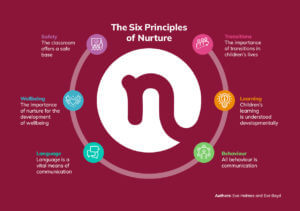Emotional and Mental support
At Temple Grove, we offer a variety of different ways to support pupils emotional and mental needs. These vary from short term informal provision to specific regular intervention with trained specialists.
These include:
- Emotional Literacy Support (ELSA)
- Play Therapy
- Emotional Support Worker (ESW)
- Nurture breakfast
- Nurture lunch

Terri-Lea Gilbert is our ELSA and Nurture. She works with individuals and groups to support their emotional development. She works with Susie to advise the Senior Leadership Team on whole school approaches to ensure children feel supported.

Susie Horton is our play therapist and also a Nurture Lead. She delivers different play therapy dependent on need in her dedicated play therapy space. She works with Ms Gilbert to advise the Senior Leadership Team on whole school approaches to ensure children feel supported.
Emotional Literacy Support Assistant (ELSA)
ELSAs can support the children and young person’s emotional development and help them cope with life’s challenges. ELSAs will also help children and young people to find solutions to problems they might have. They are not there to fix problems but to help children find their own solutions and offer that important support to a child or young person.
You can find out more about ELSA here:
Nurture
Nurture is a way of relating to children that helps them develop vital social skills, confidence and self-esteem, and become ready to learn. The nurturing approach to education offers a range of opportunities for children and young people to engage with missing early nurturing experiences, giving them the social and emotional skills to do well at school and with peers, and to develop their resilience and self-confidence. It encourages pupils to take pride in achieving – addressing the social and emotional needs that can hamper learning.

Visit the Nurture UK website here.
Parent-Child Attachment Play
This is a gentle play-based approach which supports families with their children’s behaviour and emotional wellbeing. It is a gentle, play-based approach delivered in a small group each week.
Parent-Child Attachment Play looks at three different skills for the parent to use with their child at home, enabling parents to begin a short weekly ‘you and me’ play or activity time at home with their child.
The sessions take place in a relaxing atmosphere, accompanied by hot drinks and cakes, they give parents a great opportunity to share experiences and learn how to move forward with lots of support.
Play Therapy
Play is a natural part of children’s lives. The toys are their words, play their language.
Play Therapy provides a safe environment for children to work through what is troubling them. It uses a variety of tools such as clay, puppets, sand, art, craft and drama to help children resolve their difficulties.
Play Therapy can be helpful for children that have a range of difficulties, including:
- Separated or divorced home environment
- Abuse or neglect
- Bereavement
- Being bullied or bullying
- Behavioural difficulties
- Emotional difficulties such as anxiety, low self-esteem or aggression
- Trauma
- Problems socialising
